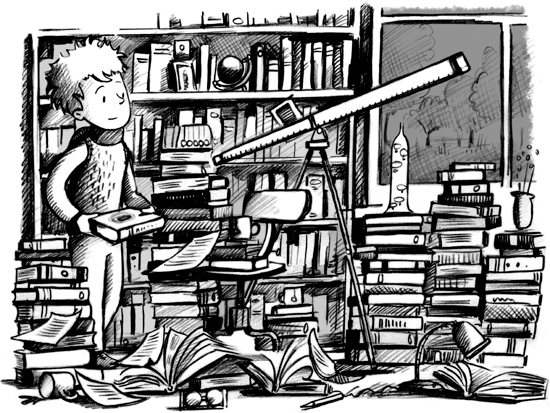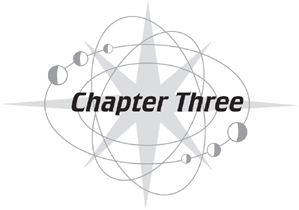If George had thought the kitchen was untidy, then this next room was in a whole different dimension of messiness. It was filled with piles and piles of books, stacked up so high that some of the wobbly towers reached almost to the ceiling. As Freddy charged right through the middle of the room, notebooks, paperbacks, leather-bound tomes, and bits of paper flew up in a tornado around him.

“Catch him!” shouted Eric, who was trying to drive the pig back toward the kitchen.
“I’m trying!” George shouted back as he was batted in the face by a shiny-jacketed book.
“Hurry!” said Eric. “We must get him out of here.”
With a great leap, Annie’s dad hurled himself right onto Freddy’s back and grabbed his ears. Using them as a sort of steering wheel, he turned the pig—who was still moving at quite some speed—and rode him like a bucking bronco through the door and back into the kitchen.
Left alone, George looked around in wonder. He had never been in a room like this before. Not only was it beautifully, gloriously messy as all the papers flying about in the air came gently down to the ground, but it was also full of exciting objects.
On the wall, a huge blackboard covered with symbols and squiggles in colored chalk caught his eye. It also had lots of writing on it, but George didn’t stop to read it. There were too many other things to look at. In the corner, a grandfather clock ticked slowly, the noise of the swinging pendulum clicking in time with a row of silvery balls suspended on very fine wire that seemed to be in perpetual motion. On a wooden stand was a long brass tube that pointed up toward the window. It looked old and beautiful, and George couldn’t resist touching the metal, which felt cool and soft at the same time.
Eric walked back into the room with his shirt untucked, his hair standing on end, his glasses at a strange angle, and a huge smile on his face. In his hand he held a book, which he had caught while riding Freddy out of the room.

“George, this is incredible!” Eric looked thrilled. “I thought I’d lost it—it’s my new book! I couldn’t find it anywhere. And now your pig has found it for me! What a result!”
George just stood there, hand on the metal tube, staring at Eric openmouthed. He’d been expecting to get into trouble for the damage his pig had wreaked. But Eric didn’t even seem angry. He wasn’t like anyone George had ever met—he never seemed to get angry, no matter what happened in his house. It was all very baffling.
“So I must thank you for all your help today,” continued the peculiar Eric, putting the lost book on top of a cardboard box.
“Help?” echoed George faintly, who couldn’t quite believe what he was hearing.
“Yes, help,” said Eric firmly. “As you seem so interested in science, perhaps I could tell you a bit more about it, by way of a thank-you. Where shall we start? What would you like to know?”
George’s mind was so full of questions that he found it hard to pick just one. Instead, he pointed at the metal tube. “What’s this?” he asked.
“Good choice, George, good choice,” said Eric happily. “That’s my telescope. It’s a very old one—four hundred years ago, it belonged to a man called Galileo. He lived in Italy, and he loved looking up at the sky at night. At that time, people believed that all the planets in our Solar System went around the Earth—even the Sun, they thought, orbited our planet.”
“But I know that’s not true,” said George, putting his eye to the old telescope. “I know that the Earth goes around the Sun.”
“You do now,” said Eric. “Science is also about gaining knowledge through experience—you know that fact because Galileo discovered it all those years ago. By looking through his telescope, he realized that the Earth and all the other planets in the Solar System orbit the Sun. Can you see anything?”
“I can see the Moon,” said George, squinting up the telescope, which was angled up to look out of the living room window into the evening sky. “It looks like it’s smiling.”
“Those are scars from a violent past, the impacts of meteorites that crashed on the surface,” said Eric. “You can’t see very far with Galileo’s telescope, but if you went to an observatory and looked through a really big telescope, you would be able to see stars billions and billions of miles away—stars so far away that by the time their light reaches our planet, they may actually already be dead.”
“Can a star die? Really?” asked George.
“Oh yes,” said Eric. “But first I want to show you how a star is born, and then we’ll take a look at how it dies. Hang on a minute, George, while I get everything set up. I think you’re going to like this.”
